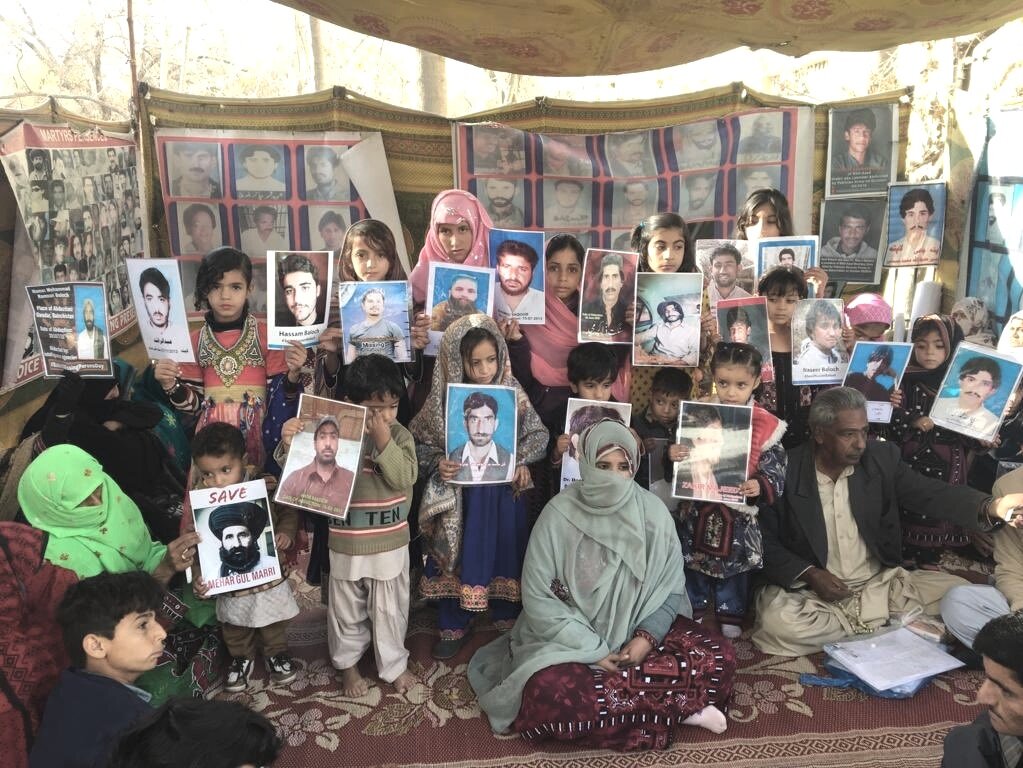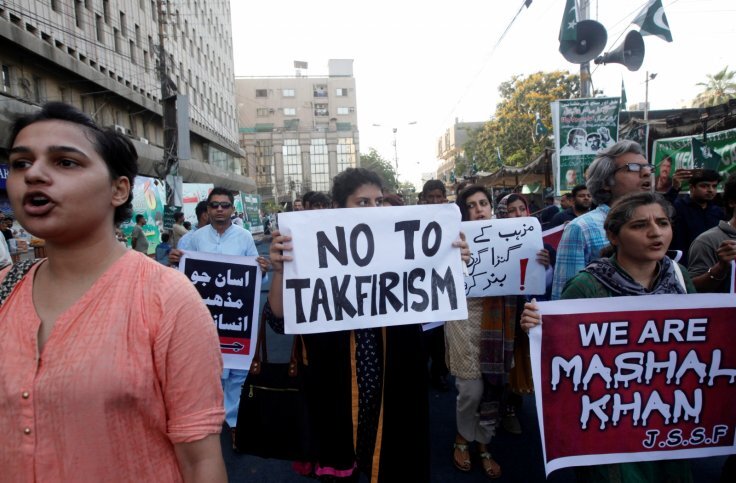Yes, I am a Poem
Acclaimed poet, playwright, satirist, and public intellectual Salman Haider presents his most incisive works on the casualties of war, nationalism, and other forms of state violence.
Protest against enforced disappearance of Baloch activists. Image: Twitter
صفحے سے باہر ایک نظم
ابھی میرے دوستوں کے دوست لاپتہ ہو رہے ہیں
پھر میرے دوستوں کی باری ہے
اور اس کے بعد میں
وہ فائل بنوں گا
جسے میرا باپ عدالت لے کر جائے گا
یا وہ تصویر جسے میرا بیٹا صحافی کے کہنے پر چومے گا
یا وہ چپ جو میری بیوی پہنے گی
یا وہ بڑبڑاہٹ جو میری ماں تصویر پر پھونکنے سے پہلے گنگنائے گی
یا وہ عدد جس سے میں کسی قید خانے میں پکارا جاؤں گا
یا وہ گناہ جو کبھی سرزد نہیں ہوا
یا وہ اعتراف جس پر میں نے اغوا ہونے سے پہلے دستخط کر دیے تھے
یا وہ فیصلہ جو اس اعتراف سے پہلے لکھا جا چکا تھا
یا وہ سزا جو مجھ پر اور میرے لوگوں پر برابر تقسیم کر دی گئی
یا وہ قانون جس کی بساند سے تہذیب یافتہ نتھنے گھن کھاتے ہیں
یا وہ کمیشن جو اس قانون کا پرفیوم چھڑک کر میز پر بیٹھتا ہے
یا وہ نظم جو میرے دوست کا دوست کل لکھے گا
ہاں میں ایک نظم ہوں
میرے سامنے والے صفحے پر ایک تصویر قید ہے
جس کے ادھ کھلے ہونٹوں کی ایک باچه پر بوسہ کھلا ہوا ہے اور دوسری گنگناہٹ سے لتھڑی ہوئی ہے
اس کے برابر فریم میں ایک فائل ہے اور ساتھ والی دراز میں؟؟؟
شاید گناہ اعتراف اور سزا رکھے گئے ہوں
میں وہ دراز نہیں کھول سکتا
اس کے لیے مجھے اپنے صفحے سے نکلنا پڑے گا
نظموں کا صفحوں سے باہر نکلنا جرم ہے
کتابوں کو الماریوں سے رہا کروانے کی طرح سنگین...
A Poem Off The Page
Right now the friends of my friends are being disappeared
Soon it will be my friends’ turn
And then mine…
When I become the file
that my father will bring to court hearings
Or the picture that my son will kiss when asked by a journalist
Or the silence that my wife will wear as jewelry
Or the murmurs of the prayers that my mother will utter before blowing softly on my picture
Or the number that will be used to call and summon me in prison
Or the sin that I never sinned
Or the confession that I had signed even before I was abducted
Or the sentence that was given even before I confessed
Or the punishment that is meted out evenly to me and my people
Or the law whose stench is nauseating to civilized noses
Or the commission that dabs the perfume of such laws before convening
Or the poem that the friends of my friends will write, tomorrow
Yes, I am a poem
A picture is imprisoned on the page opposite mine,
With parted lips, one holding a blossoming kiss, the other drenched in hums of songs
A framed file beside it, and in the drawer next to it???
Sins, confessions, and punishments, perhaps
I cannot open that drawer
For I will have to leave this page to do so
And leaving a page of verse is a serious sin
As grave as helping books escape locked closets.
Translation by Ahsan Kamal, Tanqeed Magazine.
Salman Haider wrote this poem on the disappearance of human rights activist Wahid Baloch from Karachi in July 2016. Wahid remained missing for four months, becoming yet another casualty of a vicious campaign of violence against activists, political workers and journalists, perpetrated by agencies of the deep state. The poem sadly foretold Salman’s own “disappearance” in January 2017 for three weeks.
Pakistani soldiers torturing a Bangladeshi liberation fighter in 1971. Image: DAWN
قاتل کے ہاتھ سے نہیں
تمغوں کے پھندے بنانے والے
مرنے والے کی بہادری کا نہیں
رونے والوں کی آواز کا ناپ لیتے ہیں
شہادت کی ساونڈ پروف مبارکباد
سسکیوں پر ڈهکنے کے لیے تیار کی جاتی ہے
دلاسے کی ہتھکڑیاں
ماتم کرنے والوں کے ہاتهوں میں پہنائی جاتی ہیں
تکریم کے بگل
بچ جانے والوں کو اپنی بدنصیبی کا احساس دلاتے ہیں
مجھے ہمیشگی کے طشت میں اپنے مقتول کی دستار قبول ہے
لیکن قاتل کے ہاتھ سے نہیں…
Not From The Hands Of Murderers
Makers of the nooses of medals
Measure not the bravery of the slain,
But the wails of those who grieve
Soundproof salutations of martyrdom
are readied to shroud the sobs of the living
Handcuffs of condolence
are strapped on the wrists of the mourners
And trumpets of honor
Serve only to remind survivors of their misfortune
I accept the decoration of my slain
On the platter of immortality
…but not from the hands of their murderers
One of many print ads from Dawn newspaper during the 1971 war in East Pakistan. Here, General Yahya Khan is appealing to the Pakistani people for financial support to fund the war. Image: DAWN
جنگ: ایک کولاژ
مورچے کھودنے کا کفارہ دینے کو
قبریں جسموں سے پر کرنی پڑتی ہیں
***
بوڑهی کمریں بیٹوں کے دفنانے کو جھکتی ہیں
سیدهی نہیں ہوتیں
***
قبروں پر جو پانی چھڑکا جاتا ہے
چکھ کر دیکھو
اس میں نمک ہے
***
پائینتی لگ کر آپ ہی آپ سلگنے والی اس عورت نے
جنگ چھڑنے سے خوابوں کے دفنانے تک
خوشبو نہیں پہنی
***
سرہانے پر ہاتھ پھیرتی ماں سے پوچهو
جیتا کون
***
تمغے جس سونے سے ڈهالے جاتے ہیں
اس میں سے نیت کا کھوٹ علیحدہ کرنا ناممکن ہے…
War: A Collage
To atone for the digging of trenches
Graves must be filled with bodies
***
Aged spines bent to bury sons
Do not straighten
***
Water sprayed on graves
Taste it
It is salty
***
The woman smouldering alone at the foot of the bed
Since the inception of battle to the interment of her dreams
Has not worn fragrance
***
Ask the mother caressing the head
Who won
***
From the gold used to cast medals
…it is impossible to separate the corruption of mal-intent.
Demonstrators hold signs and chant slogans condemning the killing of Mashal Khan, student of Abdul Wali Khan University after he was accused of blasphemy, during a protest in Karachi, Pakistan. Image: Akhtar Soomro/Reuters
میں اس عقیدے کی اوسط عمر پار کر چکا ہوں
جو میرے شناختی کارڈ پر لکھا ہے
محبت کی نظمیں لکھنے کا وقت
چوراہوں پر پلے کارڈ تھامے
زندہ رہنے کا حق مانگنے میں خرچ ہو گیا
گاڑیاں میرے پاس سے گولی کی طرح گزرتی رہیں
زندگی 120 میل فی گھنٹہ کی رفتار سے کم پر چلانا منع ہے اس لیے
کوئی یہ پوچھنے کو نہیں رکا
کہ میرے حلق کے کاسے میں نعروں کے سکے ہی کیوں کھنکتے ہیں
میں بینروں کے لٹھے پر لکھنے کو وہ مقدس لفظ کہاں سے
لاؤں جو پیدا ہونے کا گناہ بخشوا سکیں…
I have crossed the average age of the faith
Inscribed on my identity card
The time to write love songs
Spent bearing placards on crossroads
Asking for the right to live
Cars zipped by me as bullets
Because it is forbidden to run life at a speed less than 120 miles an hour
No one stopped to ask
Why the begging bowl of my throat clatters only with the coins of slogans
Where do I find the sacred words to write on my banners
to be pardoned for the crime of my birth?
Salman Haider, a teacher by profession, makes it a point to try everything that comes his way. Literature, theater acting, play writing, and journalism are what he has been doing lately.




